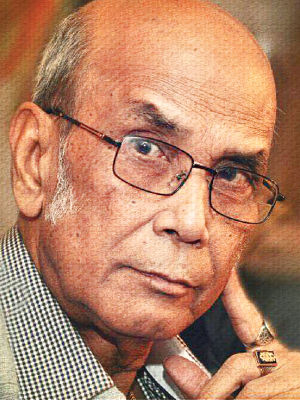LONELY POET, QUIET RESTAURANT/ ONLY YOU
[translated poetry]
LONELY POET, QUIET RESTAURANT
Words in the head, restaurant nearby
Clouds have amassed in the month of Asharh reminding of
Distressed days—streets are bumpy all over.
Who knows when they’ll be cleared of mud-heaps!
In these hours he has to find a way out.
Poetry and coffee are waiting for him.
Suddenly rain starts, with thunderbolts.
The poet falls down slipping.
His whole body gets smudged with mud.
Should he still go now?
He stands motionless passing hours.
Yet, does love stop its course?
It continues to stay even in distress.
Though streets are slippery, clothes muddy,
Walk, keep walking, don’t delay.
However frantic or antagonistic time is—
Don’t stop flow of poetry.
Is poetry to remain static?
After a storm, take a notebook in hand.
Coffee and light from the restaurant beckon,
Milk is replaced by memories, black coffee and words.
2.
Flowers in the vase dispensing rain-soaked smell
Create illusion in the restaurant at night.
Whose unfurled hair falls on the lonesome chest?
The crazy Padma devours land during Asharh.
Fire flares up, wants to jump straight—
It’s not easy to forget burning.
The poet went to stars, not the past
That day he knew the heavenly touch.
Now flowers and hair smell the same.
Now it’s only smell, only darkness.
3.
The smell of steaming coffee. Two flowers drawn in a plate
Have hugged each other in two long stalks.
The poet came to the restaurant many times
And endured pangs
Of separation alone. This Asharh it rained a lot.
The notebook to write poetry is nearby.
Alone in the restaurant, the poet continues
Sipping coffee.
Vast is the world, everything can be
A subject matter of poetry.
But today there’s nothing except a
Sole face.
The first light of dawn falls on the face every day.
Love continues—but coffee ends
As he keeps sipping.
4.
She’s gone, but the poet is still in the restaurant.
He slowly pours black coffee in a white plate.
This is that chair, this is that table.
Still blue, window curtains rustle.
Loneliness is white, death deep black.
What made life meaningful was lost in an instant.
Flowers and ashtrays are still on the table.
Only she’s no more. Ash in the ashtray flies
In despondent air as a reminiscence today.
The flowers still smell in the restaurant.
Light goes out in a river of memory.
The fountain pen has water instead of ink.
ONLY YOU
Leaving you behind
Can I go anywhere?
You’re my flag, the delta of agriculture.
Dream of my palms, you’re the smell of aman rice
Brush of my artwork.
Rhythm of poetry, you’re my words,
The very first utterance of a child.
Thirteen hundred milk rivers flow within you.
I descend from hills to the plains
Like a new strip of land, your cheeks are wakeful
You’re mine—in love, I’m yours.
You shine forth all around so gracefully
Wherever I go, I see you, only you.
Even in the dark, I feel you in my breath,
You also exist in the first light of dawn!
![]()
নিঃসঙ্গ কবি, নির্জন রেস্তোরাঁ
মাথার ভেতরে লেখা। অদূরে রেস্তোরাঁ।
আষাঢ় সেজেছে খুব মেঘে মেঘে-মনে সে করাবে
বিরহ বিপন্ন দিন-রাস্তাঘাট আদ্যোপান্ত খোঁড়া।
মাটির পাহাড়গুলো কতদিনে কে জানে সরাবে!
এরই মধ্যে পথ করে নিতে হবে আজ।
অপেক্ষায় কবিতা ও কফি।
হঠাৎ বৃষ্টির শুরু, ধমকাল বাজ।
পিছলে পা পড়ে গেল কবি।
সমস্ত শরীরে কাদা। এভাবে কি যাওয়া যেতে পারে?
বিমূঢ় দাঁড়িয়ে থেকে কেটে যায় কাল।
তবুও কি প্রেম কিছু ছাড়ে?
বিরহেও রয়েছে বহাল!
যদিও পিছল পথ, জামা কাদা লেপা।
হেঁটে চলো,হেঁটে চলো,দাঁড়িয়ে থেকো না।
সময় যতই হোক বিরুদ্ধ বা খেপা-
কবিতাকে ঠেকিয়ে রেখো না।
কবিতা কি থেমে থাকবার!
দুর্গতির একশেষ, খাতা তবু শক্ত হাতে ধরা।
হাতছানি দেয় কফি, আলো রেস্তোরাঁর,
দুধের বদলে স্মৃতি, কালো কফি, শব্দের শর্করা
২
বৃষ্টিভেজা গন্ধ ছড়ায় ফুলদানিতে ফুল।
ঘটিয়ে দেয় ইন্দ্রজাল রাতের রেস্তোরাঁয়।
একলা বুকে আছড়ে পড়ে ও কার খোলা চুল।
আষাঢ় এলে পদ্মা পাগল-পেলেই ভূমি খায়!
আগুন ওঠে দপদপিয়ে, লাফাতে চায় খাড়া-
ভোলা তো খুব সহজ নয় চিরে ফেলার ধাঁচ।
অতীতও নয় গেছেন কবি নক্ষত্রের পাড়া,
সেদিন কবি জেনেছিলেন স্বর্গীয় তার আঁচ।
ফুলের সাথে চুলের গন্ধ এখন একাকার।
এখন শুধু গন্ধটুকুই-এবং অন্ধকার ু
৩
কফির গরম গন্ধ। পেয়ালায় আঁকা দুটি ফুল
দীর্ঘ দুটি বৃন্তে তারা পরস্পর জড়িয়ে রয়েছে।
কত দীর্ঘদিন কবি রেস্তোরাঁয় এসেছে ও
একাকী সহেছে
বিরহ বিচ্ছেদ তার। আষাঢ়ের বৃষ্টিপাত হয়েছে তুমুল।
কবিতার খাতাটি পাশেই।
রেস্তোরাঁয় একা কবি চুমুকে চুমুকে
পান করে চলে কফি।
পৃথিবী বিপুল আর লেখার বিষয় তার
হতে পারে সবই।
কিন্তু আজ সেই মুখ-একটি সে মুখ ছাড়া
আর কিছু নেই।
ভোরের প্রথম আলো প্রতি ভোরে পড়ে সেই মুখে।
ফুরোয় না ভালোবাসা-কফি শেষ হয়ে যায়
চুমুকে চুমুকে
৪
সে নেই,তবুও কবি আসে রেস্তোরাঁয়।
ধীরে কালো কফি ঢালে শাদা পেয়ালায়।
এই সে চেয়ার আর এই সে টেবিল।
জানালার পর্দা ওড়ে এখনো তো নীল।
শূন্যতার রং শাদা, মৃত্যু ঘন কালো।
যা ছিল জীবনব্যাপী-মুহূর্তে মিলাল।
এখনো টেবিলে ফুল-ছাইদান পড়ে।
কেবল সে নেই আর। স্মৃতি হয়ে ওড়ে
ছাইদানে ছাই আজ করুণ বাতাসে।
রেস্তোরাঁয় সেদিনের ফুলগন্ধ ভাসে।
স্মৃতির নদীতে নেভা আলোর বিকন।
কালির কলমে লেখা জলের লিখন
তুমিই শুধু তুমি
আমি কি আর তোমাকে ছেড়ে
কোথাও যেতে পারি?
তুমি আমার পতাকা, আমার কৃষির বদ্বীপ।
করতলের স্বপ্ন-আমন ধানের গন্ধ তুমি
তুমি আমার চিত্রকলার তুলি।
পদ্য লেখার ছন্দ তুমি সকল শব্দভুমি।
সন্তানের মুখে প্রথম বুলি।
বুকে তোমার দুধের নদী সংখ্যা তেরো শত।
পাহাড় থেকে সমতলে যে নামি
নতুন চরের মতো তোমার চিবুক জাগ্রত
তুমি আমার, প্রেমে তোমার আমি।
এমন তুমি রেখেছ ঘিরে এমন করে সব
যেদিকে যাই তুমিই শুধু তুমি!
অন্ধকারেও নিঃশ্বাসে পাই তোমার অনুভব,
ভোরের প্রথম আলোতেও তো তুমি!
Translator’s Statement:
Syed Shamsul Haq, one of the leading poets and writers of Bengali literature, is best known as an ambidextrous author—his work is powerful both in content and style. Bengali speaking people around the world read and praise his poems and novels. His dramas, mostly written in verse, are also popular, and they are staged for a wider audience around the country. His work is also critically acclaimed, and he received all the great and prestigious national prizes for his outstanding contributions to literature. Haq deals with a wide range of themes, including Bangladeshi reality, love, human suffering, conflict, and so on. A major portion of his work features the Liberation War of Bangladesh that took place in 1971, resulting in the emergence of Bangladesh, though at the cost of millions of lives. A valuable poetic voice, Haq deserves to be translated into English for a wider audience.
As an enthusiast of poetry, I love reading poems, both Bengali and English, by various poets in Bangladesh and around the world. Besides writing poetry in English, I translate from Bengali, my mother tongue, into English. Bengali literature is very rich and needs to reach global readership through extensive translation. With that note, I would like to state that I feel inspired to translate major poets and fiction writers of Bengali literature into English.
Haq is one of my favorite poets, but it is distressing that he has not drawn widespread attention for translation, though a few works by him have appeared in English translation recently. After translating a few of his short stories, I have attempted to carry across his poems into English. It would be my distinct pleasure to translate a book-length work of the poet, and I look forward to the project. Translation, to me, is inevitable, because without translation we cannot imagine the contemporary world or build bridges between nations. Literary translation connects countries and continents, widening scopes for cultural collaborations.
“Lonely Poet, Quiet Restaurant” and “Only You” are among Haq’s important poems. While translating, I cast emphasis, in general, on the intended meaning of the original text. Instead of being more faithful to the original, I attempt to concentrate on flow and readability in the target language. The same is true about these two poems—I have attempted to keep the intended meaning of the original intact in the translation. Both poems are charged with deep emotion, so I have endeavored to render the romantic atmosphere for the target audience. Without hinging upon the original, I have carried across the poet’s “mind’s speech.” Literary translation, no doubt, is my area of interest and passion, and translating Bengali poetry for international readers is always special for me. Translating Haq’s work into English, thus, gives me immense pleasure.
 Mohammad Shafiqul Islam is author of three books: Wings of Winds (Poetry, 2015), Humayun Ahmed: Selected Short Stories (Translation, 2016), and Aphorisms of Humayun Azad (Translation, 2017). In February 2017, he was a poet-in-residence at the Anuvad Arts Festival, India, and his poetry and translation have appeared in Critical Survey, Journal of Postcolonial Writing, Poem, SNReview, Reckoning, Dibur, Armarolla, Light, Bengal Lights, and elsewhere. His work has been anthologized in a number of books, including The Book of Dhaka: A City in Short Fiction. He is a PhD candidate in the Department of English, Assam University, India, and teaches English at Shahjalal University of Science and Technology, Sylhet, Bangladesh.
Mohammad Shafiqul Islam is author of three books: Wings of Winds (Poetry, 2015), Humayun Ahmed: Selected Short Stories (Translation, 2016), and Aphorisms of Humayun Azad (Translation, 2017). In February 2017, he was a poet-in-residence at the Anuvad Arts Festival, India, and his poetry and translation have appeared in Critical Survey, Journal of Postcolonial Writing, Poem, SNReview, Reckoning, Dibur, Armarolla, Light, Bengal Lights, and elsewhere. His work has been anthologized in a number of books, including The Book of Dhaka: A City in Short Fiction. He is a PhD candidate in the Department of English, Assam University, India, and teaches English at Shahjalal University of Science and Technology, Sylhet, Bangladesh.
 Syed Shamsul Haq (1935-2016), a leading Bangladeshi poet, is also widely known as an ambidextrous writer and a renowned playwright. Haq chose writing as the sole profession for his livelihood, an example which is rare in the history of Bengali literature. He enriches Bengali literature by contributing a wide range of poetry, fiction, and drama. His work features Bangladeshi reality along with universal themes of literature. He received prestigious literary prizes, including Ekushey Padak, Bangla Academy Award, and Independence Award. His notable works include Payer Awaj Pawa Jai, Nuruldiner Sara Jibon,Khelaram Khele Ja, Duratwa, Neel Dongshan, Nishiddho Loban, and Boishekhe Rochito Ponktimala.
Syed Shamsul Haq (1935-2016), a leading Bangladeshi poet, is also widely known as an ambidextrous writer and a renowned playwright. Haq chose writing as the sole profession for his livelihood, an example which is rare in the history of Bengali literature. He enriches Bengali literature by contributing a wide range of poetry, fiction, and drama. His work features Bangladeshi reality along with universal themes of literature. He received prestigious literary prizes, including Ekushey Padak, Bangla Academy Award, and Independence Award. His notable works include Payer Awaj Pawa Jai, Nuruldiner Sara Jibon,Khelaram Khele Ja, Duratwa, Neel Dongshan, Nishiddho Loban, and Boishekhe Rochito Ponktimala.




